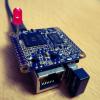Search the Community
Showing results for tags 'nanopineo'.
-
I realize there have been a few topics on this, but it seems to me that this was considered fixed. When using 5.23 with a 4.8 kernel, the MAC address was stable. After upgrading to 5.25, the MAC address was still the same as before. However after an outage, the two boards running 5.25 came up with a new MAC address (two boards still running 5.23 came up with the same MAC address). Then the MAC address seems to change every boot. The problem is that the FiOS router (an ActionTec) I have remembers both the machine name and the MAC address (it nicely creates a DNS entry). If the same name appears with a different MAC address, it ignores the name from DHCP and create a new entry with a made-up name. The router does not let you delete an entry, only rename it. (It is obviously a case of a router trying to be too smart for its own good: why does not it trust the DHCP name to begin with?) So now I have unpredictable IP addresses and names. Searching through google, I found an advice to add "hwaddress ether xx:xx:xx:xx:xx" to /etc/networks/interfaces. However after setting the MAC address this way (to the original MAC address), the network does not start properly and no new machine is even listed by the router. If I remove the statement, the network starts again. Any advice, or pointer to the right topic, will be appreciated. Thanks.
-
I want to use an ESP-12F to add wireless to my NanoPi Neo, but I don't think the Neo has broken out all the connections I'd need. Hackaday desctibes how to interface a Raspberry Pi B+ to an ESP-12F (https://hackaday.io/project/8678/instructions), but the Neo seems to lack some of the required pins. I like this idea since I've liked the performance and ability of every esp8266 system I've used. Their wifi network is solid, and they're low cost. Is this a lost cause or is it possible? Or perhaps this is a dumb idea? I'm not sure how well it'll perform vs a usb wifi modules, but the idea has captured my imagination.
-
I noticed that the Nano Pi Neo has a pin or 2 labeled 3.3V out. How much current is available from this source? I have a CODEC and a few other things that need 3.3V power. I need to know what the 3.3V output can deliver safely, or if I should just add my own 3.3 regulator for the external circuitry.
-
I just downloaded the most recent mainline image for the NanoPi Neo (Ubuntu_xenial_dev_nightly.7z). It boots and runs fine. However, I was trying to access the UART1 on /dev/ttyS1, but apparently it is not enabled by default.The dmesg output is: dmesg | grep tty [ 0.000000] Kernel command line: root=UUID=d9678417-38b4-4c2b-993e-04cdea0247de rootwait rootfstype=ext4 console=tty1 console=ttyS0,115200 hdmi.audio=EDID:0 disp.screen0_output_mode=1920x1080p60 panic=10 consoleblank=0 loglevel=1 ubootpart=eeb8ef06-01 ubootsource=mmc sunxi_ve_mem_reserve=0 sunxi_g2d_mem_reserve=0 sunxi_fb_mem_reserve=16 cgroup_enable=memory swapaccount=1 [ 0.000973] console [tty1] enabled [ 4.066624] console [ttyS0] disabled [ 4.086857] 1c28000.serial: ttyS0 at MMIO 0x1c28000 (irq = 33, base_baud = 1500000) is a U6_16550A [ 4.086926] console [ttyS0] enabled [ 4.111551] 1c28c00.serial: ttyS3 at MMIO 0x1c28c00 (irq = 34, base_baud = 1500000) is a U6_16550A I can see that ttyS0 and ttyS3 gets initialized, but I don't see anything related to ttyS1 or ttyS2. By using setserial I can see that ttyS0 is attached to interrupt 33, but ttyS1 and ttyS2 are attached to interrupt 0 (which probably means none). I tried using minicom to talk over ttyS1 and ttyS2. It can open the port, but nothing goes through it. I was using ttyS1 before with the legacy Armbian image, and it was working fine. By updating it to the most recent ubuntu xenial it stopped working. I know this is a nightly build and is not supposed to work perfectly, but I really want to use this updated version because it runs on a more recent kernel.Any ideas on how to fix this?Thanks!
-
So I have a nanopi m1 and a neo. I'm running Ubuntu Xenial on them: https://www.armbian.com/nanopi-neo/ I'm attempting to access the gpio, when I attempt to echo to /sys/class/gpio/export I get permission denied (sudo or not, even if logged in as root). I've also found this library for python to handle gpio on the nanopi: https://github.com/jrspruitt/FriendlyARM_Python_GPIO But when I use it, it says: as root root@nanopineo:/home/admin# python test.py Traceback (most recent call last): File "test.py", line 7, in <module> gpio.gpio_init(16, 1) File "build/bdist.linux-armv7l/egg/fgpio/fgpio.py", line 85, in gpio_init File "build/bdist.linux-armv7l/egg/fgpio/fgpio.py", line 465, in _mem_open mmap.error: [Errno 1] Operation not permitted as user admin@nanopineo:~$ sudo python test.py Traceback (most recent call last): File "test.py", line 7, in <module> gpio.gpio_init(16, 1) File "build/bdist.linux-armv7l/egg/fgpio/fgpio.py", line 85, in gpio_init File "build/bdist.linux-armv7l/egg/fgpio/fgpio.py", line 465, in _mem_open mmap.error: [Errno 1] Operation not permitted admin@nanopineo:~$ python test.py Traceback (most recent call last): File "test.py", line 7, in <module> gpio.gpio_init(16, 1) File "build/bdist.linux-armv7l/egg/fgpio/fgpio.py", line 85, in gpio_init File "build/bdist.linux-armv7l/egg/fgpio/fgpio.py", line 461, in _mem_open OSError: [Errno 13] Permission denied: '/dev/mem' Permission denied is what I expect as user. But not sure what Operation not permitted is for when root/sudo. ... I'm just wondering what is the easiest way to actually access the gpio on this thing. My googling is for not so far.
-
With a little shell script I can switch gpio6 on/off: #!/bin/sh # PWM1 / GPIOA6 P=6 G="/sys/class/gpio/gpio${P}" if [ ! -d "${G}" ]; then echo "Exporting GPIO${P}" echo ${P} > /sys/class/gpio/export echo out > ${G}/direction fi i=100 while [ "$i" -gt 0 ]; do i=`expr $i - 1` sleep .2 echo 1 > ${G}/value sleep .1 echo 0 > ${G}/value done if [ -d "${G}" ]; then echo "Unexporting GPIO${P}" echo ${P} > /sys/class/gpio/unexport fi but I dont see anything which could enable PWM on this pin: root@nanopineo:~# ll /sys/class/gpio/gpio6/ total 0 -rw-r--r-- 1 root root 4096 Feb 21 11:38 active_low lrwxrwxrwx 1 root root 0 Feb 21 11:38 device -> ../../../sunxi-pinctrl -rw-r--r-- 1 root root 4096 Feb 21 11:37 direction -rw-r--r-- 1 root root 4096 Feb 21 11:38 edge drwxr-xr-x 2 root root 0 Feb 21 11:38 power lrwxrwxrwx 1 root root 0 Feb 21 11:38 subsystem -> ../../../../../class/gpio -rw-r--r-- 1 root root 4096 Feb 21 11:37 uevent -rw-r--r-- 1 root root 4096 Feb 21 11:38 value Is it possibe to enable PWM on the NanoPi Neo via sysfs?
-
Hi all, I'm trying to get some sensors working with latest Armbian on a NanoPi Neo ... 1st thing is that there are a bunch of modules loaded where I have no hardware for, f.e. pcf8591 and bmp085: root@nanopineo:~# uname -a Linux nanopineo 3.4.113-sun8i #28 SMP PREEMPT Thu Feb 2 02:01:28 CET 2017 armv7l GNU/Linux root@nanopineo:~# lsmod Module Size Used by ir_lirc_codec 3650 0 lirc_dev 7834 1 ir_lirc_codec ir_mce_kbd_decoder 2885 0 ir_sanyo_decoder 1480 0 ir_sony_decoder 1422 0 ir_jvc_decoder 1452 0 ir_rc6_decoder 1941 0 ir_rc5_decoder 1412 0 ir_nec_decoder 1556 0 sunxi_cir 1601 0 rc_core 12727 10 ir_lirc_codec,ir_rc5_decoder,ir_nec_decoder,ir_sony_decoder,sunxi_cir,ir_mce_kbd_decoder,ir_jvc_decoder,ir_rc6_decoder,ir_sanyo_decoder bmp085 3487 0 pcf8591 3363 0 g_serial 27617 0 btrfs 712409 0 root@nanopineo:~# cat /etc/modules #w1-sunxi #w1-gpio #w1-therm #sunxi-cir g_serial root@nanopineo:~# dmesg | grep plat [ 0.115079] plat: add bmp085 device [ 0.115079] plat: add pcf8591 device except for g_serial which seems loaded from /etc/modules I cant find from where the rest gets loaded ...? Then when trying to delete the instance of pcf8591 (I need address 0x48 for a lm75a ) I get: root@nanopineo:~# ll /sys/bus/i2c/devices/i2c-0/ total 0 drwxr-xr-x 4 root root 0 Jan 1 1970 0-0048 drwxr-xr-x 3 root root 0 Feb 19 19:18 0-004f drwxr-xr-x 3 root root 0 Jan 1 1970 0-0077 --w------- 1 root root 4096 Feb 21 11:02 delete_device lrwxrwxrwx 1 root root 0 Feb 19 19:17 device -> ../../twi.0 drwxr-xr-x 3 root root 0 Jan 1 1970 i2c-dev -r--r--r-- 1 root root 4096 Feb 19 19:17 name --w------- 1 root root 4096 Feb 19 19:18 new_device drwxr-xr-x 2 root root 0 Feb 19 19:11 power lrwxrwxrwx 1 root root 0 Feb 19 19:11 subsystem -> ../../../../bus/i2c -rw-r--r-- 1 root root 4096 Jan 1 1970 uevent root@nanopineo:~# echo 0x48 > /sys/bus/i2c/devices/i2c-0/delete_device -bash: echo: write error: Invalid argument root@nanopineo:~# echo 0x4f > /sys/bus/i2c/devices/i2c-0/delete_device -bash: echo: write error: Invalid argument root@nanopineo:~# echo 0x77 > /sys/bus/i2c/devices/i2c-0/delete_device -bash: echo: write error: Invalid argument here the device at 0x4f is another lm75a which I have self instantiated and which works fine - though even that I cant remove ... so my questions are: 1) from where get all those modules (pcf8591, bmp085, ir* and related) loaded and why? 2) why does deleting of devices not work? I've have an older version of Armbian running on a BPI and there I can delete instantiated devices just fine ... Excuse me if this has already been asked/answered in another thread but I have heavily searched but wasnt successful :-(
-
Hi, I'm fairly new to SBCs and Linux and try to get RS485 working on a NanoPi NEO running Armbian (Legacy 3.4.113). I build a custom shield for the NanoPi Neo with a MAX3485 taht is connected to the UART2 (TX,RX,RTS) but so far only transmission works. This is because the RTS pin which I planned to use for toggling the direction pins is always high. I tried to use ioctrl to have it been toggled automatically, but had no success so far. I'm tried to figure out whats the problem and I believe that the configuration of the UART2 does not include the RTS signal: cat /proc/tty/driver/uart |head -8 serinfo:1.0 driver revision: 0: uart:SUNXI mmio:0x01C28000 irq:32 tx:8500 rx:0 RTS|DTR 1: uart:SUNXI mmio:0x01C28400 irq:33 tx:0 rx:0 CTS 2: uart:SUNXI mmio:0x01C28800 irq:34 tx:0 rx:0 CTS 3: uart:SUNXI mmio:0x01C28C00 irq:35 tx:0 rx:0 CTS I also figured out that i can decompile the /boot/script.bin to the original fex file: bin2fex script.bin > script.fex In there I can see that no RTS signal is configured for uart2 (for some reason the is also none configured for uart0 which doesn't match with the output above for som reason!?) [uart2] uart_used = 1 uart_port = 2 uart_type = 2 uart_tx = port:PA00<2><1><default><default> uart_rx = port:PA01<2><1><default><default> On the linux-sunxi website I found out that I could add RTS to this configuration: http://linux-sunxi.org/Fex_Guide#uart_configuration Am I correct in assuming that I only need to change the config for UART2 like this: [uart2] uart_used = 1 uart_port = 2 uart_type = 4 uart_tx = port:PA00<3><1><default><default> uart_rx = port:PA01<3><1><default><default> uart_rts = port:PA02<3><1><default><default> uart_cts = port:PA03<3><1><default><default> The compile it again, replace the current script.bin with the new one and reboot in order to get RTS working? Any help is highly appreciated!
-
Hi, I used to run a RPi3 as a VPN and DNS-Server (PiHole) and it worked like a charm. Since the RPI3 is a bit oversized for this work I bought a NanoPi Neo 512MB and installed armbian Ubuntu 4.9.x, but I have some issues with it: - eth0 is only connected by 100/half duplex. I can set it manually to full duplex with autoneg off, but after a few secondes it falls back to 10(!) half duplex. with autoneg on it comes back to 100 half duplex (the amber led is off; cable and switch are ok) - the MAC-Adress is changing every reboot. I have to fix it manually - I can set up Pihole to use the Nanopi as a DNS-Server and it works well in the LAN, until I connect over openVPN (over WAN) to the NanoPi. Then Pihole-DNS-Server stops working and I'll get kicked out of VPN. I can reconnect a few times but suddenly the Nanopi will crash. What can I do? I'm a little bit frustrated right now.
-
Hi there, I want to use my NanoPi in a Walloutlet to controll my Sonos system. My Problem at the moment is that the Nano PI gets really hot (65° Celsius). At the moment i only got a Raspberry Pi Cooling set(http://www.conrad.ch/ce/de/product/1267831/Kuehlungs-Kit-Raspberry-Pi-A-B-B-Cubieboard-Banana-Pi). Is there a way to get the Board to get to 45° Celsius with no fan? Thanks for the Project, good to see that someone works on these devices to keep them Supported with the newest stuff. Greetings from Switzerland Twosky2000
-
I'm trying to set the Pin G11 on a NanoPi Neo, previously configured as input, to output in C++ by mapping the PIO function register into the virtual memory with mmap and setting a single bit. As per the Allwinner H3 Datasheet the following hardware addresses are specified: Similar to the Raspberry Pi's function register, the Pin knows at least two states: 000: input 001: output ... In my Script, I'm therefore trying to set the 12th bit of the PG Configure Register 1. Here's my C++ code: struct peripheral { unsigned long addr_hardware; int map_size; int mem_fd; void *mem_map; volatile unsigned long *addr_virtual; int map() { if ((mem_fd = open("/dev/mem", O_RDWR | O_SYNC)) < 0) return -1; // map addr_hardware=0x01C20000 into /dev/mem if ((mem_map = mmap(0, map_size, PROT_READ | PROT_WRITE, MAP_SHARED, mem_fd, addr_hardware)) == MAP_FAILED) return -1; // store virtual address with offset of 0x800, which was rounded down before addr_virtual = (volatile unsigned long *) mem_map + 0x800; return 0; }; void unmap() { munmap(mem_map, map_size); close(mem_fd); }; }; int main() { // initialize peripheral at rounded down PIO base address peripheral gpio {0x01C20000, 4096 * 10}; // map PIOs into virtual memory if (gpio.map() == -1) return -1; // output current value of PG Configure Register 1 cout << bitset<32>(*(gpio.addr_virtual + 0xDC)) << endl; // set 12th bit *(gpio.addr_virtual + 0xDC) |= (1 << 12); // output value of register after setting the 12th bit cout << bitset<32>(*(gpio.addr_virtual + 0xDC)) << endl; gpio.unmap(); return 0; } Unfortunately, my code does not work. When I configure the Pin G11 as Output (via WiringNP), the displayed value doesn't change. I'm checking the proper functionality of my code with an LED (it should turn on when state is changed from IN to OUT because it is set to HIGH). When I run the script again, the content of the PIO Configure Register has changed to its previous state. When altering the map_size, I get the following results (spaces added for better readability): > gpio {0x01C20000, 4096 * 2} < 00000000 00000000 00000000 00000000 < 00000000 00000000 00010000 00000000 > gpio {0x01C20000, 4096 * 10} < 00000000 00000000 00000000 00110011 < 00000000 00000000 00000000 00110011 I am expecting the following result: > gpio {0x01C20000, 4096 * 10} < 00000000 00000000 00000000 00110011 < 00000000 00000000 00010000 00110011 Any help would be very appreciated
-
As I reported yesterday, after an upgrade, wifi was lost. Although wlan devices were visible via ifconfig, no connection to AP was possible. (8192cu driver) Today I tried to have fresh Armbian build , got a 5.23 jessie login as: root root@192.168.1.15's password: _ _ ____ _ _ _ | \ | | __ _ _ __ ___ | _ \(_) | \ | | ___ ___ | \| |/ _` | '_ \ / _ \| |_) | | | \| |/ _ \/ _ \ | |\ | (_| | | | | (_) | __/| | | |\ | __/ (_) | |_| \_|\__,_|_| |_|\___/|_| |_| |_| \_|\___|\___/ Welcome to ARMBIAN Debian GNU/Linux 8 (jessie) 3.4.112-rt143-sun8i System load: 1.31 Up time: 3 min Memory usage: 15 % of 490Mb IP: 192.168.10.2,192.168.1.15 CPU temp: 34°C Usage of /: 8% of 15G [ 2 updates to install: apt-get upgrade ] Last login: Wed Oct 26 16:48:52 2016 from 192.168.1.6 root@nanopineo:~# As you see got the RT also build in 3.4.112-rt143-sun8i WiFi 8192cu driver was up and running just fine, As there were updates indicated, did the apt-get update and upgrade.. After that, AGAIN WiFi (8192cu) got lost and no connection was possible any more. Tried the armbian-firmware-full, but obviously the firmware there has some difference, the driver is no longer able to connect although shows up in ifconfig. ALSO, the kernel got a different name.. instead of "3.4.112-rt143-sun8i" now the RT was missing from title, dont know if that means anything deeper like RT mods gone for real, but I do report it. And thats the new banner login as: root root@192.168.1.11's password: _ _ ____ _ _ _ | \ | | __ _ _ __ ___ | _ \(_) | \ | | ___ ___ | \| |/ _` | '_ \ / _ \| |_) | | | \| |/ _ \/ _ \ | |\ | (_| | | | | (_) | __/| | | |\ | __/ (_) | |_| \_|\__,_|_| |_|\___/|_| |_| |_| \_|\___|\___/ Welcome to ARMBIAN Debian GNU/Linux 8 (jessie) 3.4.112-sun8i System load: 0.36 Up time: 1 min Memory usage: 8 % of 494Mb IP: 192.168.1.11 CPU temp: 36°C Usage of /: 8% of 15G Last login: Wed Oct 26 16:51:18 2016 from 192.168.1.6 root@nanopineo:~# So far the experience on upgrade shows that its untrusted at least.. One question, guys, is there any chance that my 8192cu driver wifi dongles work again in Armbian as they were a couple of days before? or should I forget about that?..
-
Got this when I do an apt-get update root@nanopineo:~# apt-get update Hit http://security.debian.org jessie/updates InRelease Ign http://httpredir.debian.org jessie InRelease Hit http://httpredir.debian.org jessie-updates InRelease Hit http://httpredir.debian.org jessie-backports InRelease Hit http://security.debian.org jessie/updates/non-free armhf Packages Hit http://httpredir.debian.org jessie Release.gpg Hit http://security.debian.org jessie/updates/non-free Translation-en Hit http://security.debian.org jessie/updates/main armhf Packages Hit http://security.debian.org jessie/updates/contrib armhf Packages Hit http://httpredir.debian.org jessie Release Hit http://security.debian.org jessie/updates/contrib Translation-en Hit http://security.debian.org jessie/updates/main Translation-en Get:1 http://httpredir.debian.org jessie-updates/main armhf Packages/DiffIndex [5,440 B] Get:2 http://httpredir.debian.org jessie-updates/contrib armhf Packages [32 B] Get:3 http://httpredir.debian.org jessie-updates/non-free Translation-en/DiffIndex [736 B] Get:4 http://httpredir.debian.org jessie-updates/non-free armhf Packages/DiffIndex [736 B] Get:5 http://httpredir.debian.org jessie-updates/contrib Translation-en [14 B] Get:6 http://httpredir.debian.org jessie-updates/main Translation-en/DiffIndex [2,704 B] Get:7 http://httpredir.debian.org jessie-backports/main armhf Packages/DiffIndex [27.8 kB] Get:8 http://httpredir.debian.org jessie-backports/contrib armhf Packages/DiffIndex [18.7 kB] Ign http://apt.armbian.com jessie InRelease Err http://apt.armbian.com jessie Release.gpg Unable to connect to apt.armbian.com:http: Ign http://apt.armbian.com jessie Release Ign http://apt.armbian.com jessie/main armhf Packages/DiffIndex Ign http://apt.armbian.com jessie/utils armhf Packages/DiffIndex Ign http://apt.armbian.com jessie/jessie-desktop armhf Packages/DiffIndex Err http://apt.armbian.com jessie/jessie-desktop Translation-en_US Unable to connect to apt.armbian.com:http: Err http://apt.armbian.com jessie/jessie-desktop Translation-en Unable to connect to apt.armbian.com:http: Err http://apt.armbian.com jessie/jessie-desktop Translation-en_US.UTF-8 Unable to connect to apt.armbian.com:http: Err http://apt.armbian.com jessie/main Translation-en_US Unable to connect to apt.armbian.com:http: Err http://apt.armbian.com jessie/main Translation-en Unable to connect to apt.armbian.com:http: Err http://apt.armbian.com jessie/main Translation-en_US.UTF-8 Unable to connect to apt.armbian.com:http: Err http://apt.armbian.com jessie/utils Translation-en_US Unable to connect to apt.armbian.com:http: Err http://apt.armbian.com jessie/utils Translation-en Unable to connect to apt.armbian.com:http: Err http://apt.armbian.com jessie/utils Translation-en_US.UTF-8 Unable to connect to apt.armbian.com:http: Err http://apt.armbian.com jessie/main armhf Packages Unable to connect to apt.armbian.com:http: Err http://apt.armbian.com jessie/utils armhf Packages Unable to connect to apt.armbian.com:http: Err http://apt.armbian.com jessie/jessie-desktop armhf Packages Unable to connect to apt.armbian.com:http: Get:9 http://httpredir.debian.org jessie-backports/non-free armhf Packages/DiffIndex [4,594 B] Get:10 http://httpredir.debian.org jessie-backports/contrib Translation-en/DiffIndex [5,500 B] Hit http://httpredir.debian.org jessie/contrib Translation-en Get:11 http://httpredir.debian.org jessie-backports/main Translation-en/DiffIndex [27.8 kB] Get:12 http://httpredir.debian.org jessie-backports/non-free Translation-en/DiffIndex [9,790 B] Hit http://httpredir.debian.org jessie/main armhf Packages Hit http://httpredir.debian.org jessie/contrib armhf Packages Hit http://httpredir.debian.org jessie/non-free armhf Packages Hit http://httpredir.debian.org jessie/main Translation-en Hit http://httpredir.debian.org jessie/non-free Translation-en Fetched 104 kB in 18s (5,614 B/s) W: Failed to fetch http://apt.armbian.com/dists/jessie/Release.gpg Unable to connect to apt.armbian.com:http: W: Failed to fetch http://apt.armbian.com/dists/jessie/jessie-desktop/i18n/Translation-en_US Unable to connect to apt.armbian.com:http: W: Failed to fetch http://apt.armbian.com/dists/jessie/jessie-desktop/i18n/Translation-en Unable to connect to apt.armbian.com:http: W: Failed to fetch http://apt.armbian.com/dists/jessie/jessie-desktop/i18n/Translation-en_US.UTF-8 Unable to connect to apt.armbian.com:http: W: Failed to fetch http://apt.armbian.com/dists/jessie/main/i18n/Translation-en_US Unable to connect to apt.armbian.com:http: W: Failed to fetch http://apt.armbian.com/dists/jessie/main/i18n/Translation-en Unable to connect to apt.armbian.com:http: W: Failed to fetch http://apt.armbian.com/dists/jessie/main/i18n/Translation-en_US.UTF-8 Unable to connect to apt.armbian.com:http: W: Failed to fetch http://apt.armbian.com/dists/jessie/utils/i18n/Translation-en_US Unable to connect to apt.armbian.com:http: W: Failed to fetch http://apt.armbian.com/dists/jessie/utils/i18n/Translation-en Unable to connect to apt.armbian.com:http: W: Failed to fetch http://apt.armbian.com/dists/jessie/utils/i18n/Translation-en_US.UTF-8 Unable to connect to apt.armbian.com:http: W: Failed to fetch http://apt.armbian.com/dists/jessie/main/binary-armhf/Packages Unable to connect to apt.armbian.com:http: W: Failed to fetch http://apt.armbian.com/dists/jessie/utils/binary-armhf/Packages Unable to connect to apt.armbian.com:http: W: Failed to fetch http://apt.armbian.com/dists/jessie/jessie-desktop/binary-armhf/Packages Unable to connect to apt.armbian.com:http: E: Some index files failed to download. They have been ignored, or old ones used instead. root@nanopineo:~# apt-get update But when I go with my browser to lets say http://apt.armbian.com/dists/jessie/jessie-desktop/binary-armhf/Packages I do get the file.. what is going on here? did I do something wrong?
-
Hi, Seen some posts where mentioning that depending of the version of kernel there is either FEX or DTS usage, old ones called Legacy, using FEX to define GPIOs and Peripherals pins. Wit Mainline Kernel, is using DTS. Yet in the recent kernel (dev) armbian builds, eg armbian 5.21, kernel 4.7.6 (on H3, NEO), seen the /boot containing all the FEX stuff script.bin etc. Is FEX still used in the mainline kernel builds? C:\Christos>ssh christos@192.168.1.131 christos@192.168.1.131's password: setsockopt IP_TOS 16: Invalid argument: _ _ ____ _ _ _ | \ | | __ _ _ __ ___ | _ \(_) | \ | | ___ ___ | \| |/ _` | '_ \ / _ \| |_) | | | \| |/ _ \/ _ \ | |\ | (_| | | | | (_) | __/| | | |\ | __/ (_) | |_| \_|\__,_|_| |_|\___/|_| |_| |_| \_|\___|\___/ Welcome to ARMBIAN Debian GNU/Linux 8 (jessie) 4.7.6-sun8i System load: 0.00 Up time: 37 min Memory usage: 9 % of 495Mb IP: 192.168.1.131 CPU temp: 34Β°C Usage of /: 8% of 15G Last login: Sun Oct 2 13:27:36 2016 from 192.168.1.6 christos@nanopineo:~$ su root Password: root@nanopineo:/home/christos# cd /boot root@nanopineo:/boot# ls -l total 15788 drwxr-xr-x 2 root root 4096 Oct 2 08:32 bin -rw-r--r-- 1 root root 6944 Oct 2 08:33 boot.bmp -rw-r--r-- 1 root root 2846 Oct 2 08:27 boot.cmd -rw-r--r-- 1 root root 2918 Oct 2 08:35 boot.scr -rw-r--r-- 1 root root 140522 Oct 2 08:22 config-4.7.6-sun8i lrwxrwxrwx 1 root root 15 Oct 2 08:32 dtb -> dtb-4.7.6-sun8i drwxr-xr-x 2 root root 4096 Oct 2 08:32 dtb-4.7.6-sun8i -rw-r--r-- 1 root root 3995879 Oct 2 08:33 initrd.img-4.7.6-sun8i lrwxrwxrwx 1 root root 17 Oct 2 08:32 script.bin -> bin/nanopineo.bin -rw-r--r-- 1 root root 2203811 Oct 2 08:22 System.map-4.7.6-sun8i -rw-r--r-- 1 root root 3995943 Oct 2 08:33 uInitrd -rwxr-xr-x 1 root root 5794016 Oct 2 08:22 vmlinuz-4.7.6-sun8i lrwxrwxrwx 1 root root 19 Oct 2 08:28 zImage -> vmlinuz-4.7.6-sun8i root@nanopineo:/boot# So if I change only the script.bin with bin2fex/fex2bin do these changes be effective in armbian latest kernel builds 4.x? Christos
-
Hi guys, I'm a bit lost with this one. I want to setup a way of basically reinstalling a NanoPi Neo over the network. My thought process is: 1. Boot from NFS. 2. In the boot process have a script that runs the nand-sata-install.sh (or modified version of). 3. Reboot with new OS from USB. Now, I'm sure I can get this working, the bit that I am having trouble working out is how the bootloader will know if we should be loading from NFS or USB. Can UBoot grab this from the network? Ideally this will also be done without SSH access. I know this is a complicated problem but any guidance in the right direction will be really appreciated. Thanks!
-
Hi, I'm getting going with a pile of Nanopi Neo's and am using the jessie server image with the legacy kernel I'm having trouble with the repositories - I see this error when using apt-get ... W: Failed to fetch http://apt.armbian.com/dists/jessie/InRelease Unable to find expected entry 'jessie-utils/binary-armhf/Packages' in Release file (Wrong sources.list entry or malformed file) I saw the discussion in http://forum.armbian.com/index.php/topic/1834-repository-management/which says the problem has been fixed ... but, er, it does not seem to be. Any ideas welcome on how to sort this out. Thanks Jason
-
Has anyone seen these? Awesome! Sure it's missing a few of the basic I/O ports such as monitor and KB...but with a Ubuntu headless setup...who needs keyboards/mice/monitors I have an old Raspberry Pi B [the 512mb and single core CPU) for $35 at my house running some VPN software, a TOR relay, and mumble VOIP server, this thing costs $7.99 and has a quad core! http://www.friendlyarm.com/index.php?route=product/product&product_id=132 In fact check out all their really small boards...heck the NanoPC-T3 is insane!!! Just a FYI if you haven't seen them yet
-
Hi guys. I am testing a NanoPi Neo for an IoT project. I ordered one with unsoldered ethernet and USB ports. I am trying to use a miniature WiFi adapter plugged in the OTG port while powering the board from either the debug +/- pins, or from the 5V bus on the GPIO. The problem is that no mater what option I choose, the board powers up just fine, I can login using the debug port serial-over-consolem however the WiFi adapter doesn't pop up in the lsusb list. Using an OTG USB hub with external power, fires up the WiFi, however this is the only working way and my project has to have minimum cable clutter. I need to be able to plug in the NanoPi Neo on a PCB using its GPIO pins as both I/O and mechanical mount and have the WiFi adapter plugged in in the OTG port. I did played a bit with the script.bin but after a couple of hours of trial and error I got nothing, I can't seem to get the OTG port to power the WiFi. I ordered some USB connectors but it will take weeks for them to arrive from China. I used lots of combinations of 2A power adapters and various thick cables to rule out a voltage drop. I believe the answer lies in some tweak but I don't have any clue. Does anyone have any idea what to try?
-
hello, I am running Armbian 5.17 on nanopi neo(linux kernel 3.4.112).Today I built Debian jessie 8 image using the armbian build tool. Now I am using D-link DWA123 dongle for wifi(rev d1,rtl8188eu chip).Now it didnt work out of the box(used wicd-curses for wifi setup,nothing shows up).So I decided to build the driver. I pulled the source from https://github.com/lwfinger/rtl8188eu and then I went to src directory /usr/src/linux...and ran make scripts which didnt return any error. after that I went inot rtl8188eu directory and ran make ARCH=arm and this is the reply I got, make ARCH=arm CROSS_COMPILE= -C /lib/modules/3.4.112-sun8i/build M=/home/npi/rtl8188eu modules make[1]: Entering directory '/usr/src/linux-headers-3.4.112-sun8i' Building modules, stage 2. MODPOST 0 modules make[1]: Leaving directory '/usr/src/linux-headers-3.4.112-sun8i' after that, "sudo make install" returned error and i saw that nothing was built. I tried the same in Ubuntu 14.04 trusty 3.4.112 and driver was compiled successfully but it didnt work either.The dongle is okay(I checked i on my Ubuntu Desktop and it worked) Now is this a bug??
-
I am having troubles with getting audio from the sunxi audiocodec on my NanoPi NEO. I enabled audio in the .fex file and the configuration is as follows: [audio0] audio_used = 1 lineout_vol = 31 cap_vol = 5 audio_hp_ldo = "none" adcagc_used = 0 adcdrc_used = 0 dacdrc_used = 0 adchpf_used = 0 dachpf_used = 0 audio_pa_ctrl = port:PA16<1><default><default><0> When I ssh into the machine the codec does come up root@nanopineo:~# aplay -l **** List of PLAYBACK Hardware Devices **** card 0: audiocodec [audiocodec], device 0: SUNXI-CODEC sndcodec-0 [] Subdevices: 1/1 Subdevice #0: subdevice #0 card 1: sndhdmi [sndhdmi], device 0: SUNXI-HDMIAUDIO sndhdmi-0 [] Subdevices: 1/1 Subdevice #0: subdevice #0 but no sound is heard over the lineout. What can I do to help and fix this? p.s. dmesg doesn't show any signs of error related to this issue: root@nanopineo:~# dmesg | grep snd [ 1.538130] asoc: sndcodec <-> sunxi-codec mapping ok [ 1.548425] asoc: sndhdmi <-> sunxi-hdmiaudio.0 mapping ok [ 1.571136] #1: sndhdmi [ 10.083262] usbcore: registered new interface driver snd-usb-audio root@nanopineo:~# dmesg | grep audio [ 1.548425] asoc: sndhdmi <-> sunxi-hdmiaudio.0 mapping ok [ 1.571129] #0: audiocodec [ 10.083262] usbcore: registered new interface driver snd-usb-audio
-
Hi All. First post here (and quite a newbie). I have installed Armbian on my new NanoPi Neo and followed the instructions. It is all booting OK and I now wondering how I can attach a speaker directly to the header 10 LINEOUTR LINE-OUT Right Channel Output 11 LINEOUTL LINE-OUT Left Channel Output 12 GND 0V Will this work? How can I test it as I cannot see it with ALSAMIXER. TIA.








